Alibaba sexual assault case: China's ugly drinking culture is a show of power
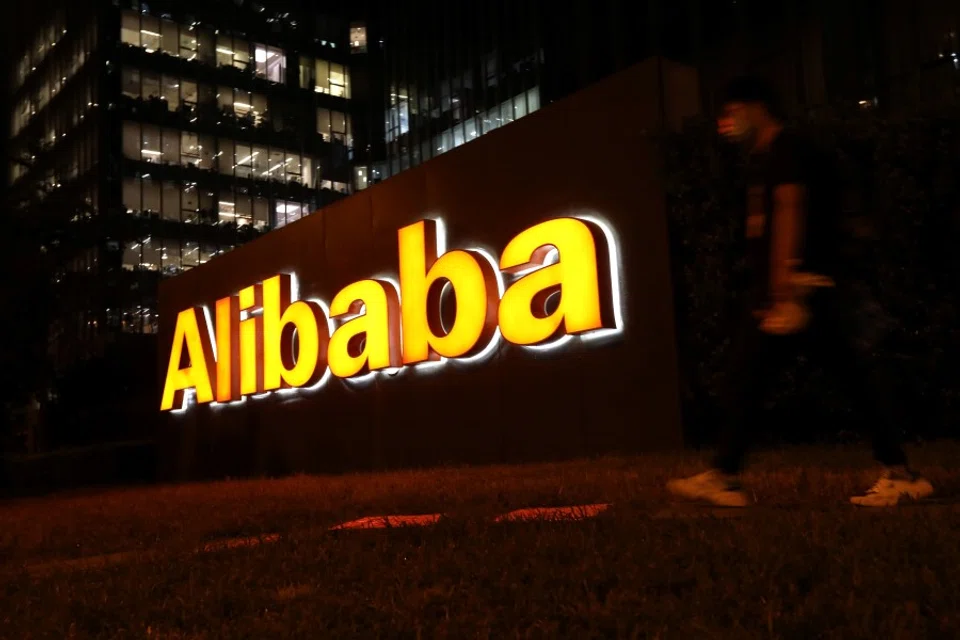
On 7 August, a female employee of Chinese internet giant Alibaba revealed that she was forced to drink and then sexually assaulted by her male manager and a client while on a business trip to Jinan last month, setting off a wave of reactions on social media.
As the incident developed, Alibaba fired the manager, adding that he "will never be rehired", while its Chief People Officer Judy Tong "received a demerit". The president of Alibaba's neighbourhood retail business group, Li Yonghe, and its human resources generalist, Xu Kun, also resigned. Waves of online criticism have been leveled against business drinking culture.
Behind the Alibaba incident
Netizens' anger is not just about a male higher-up's behaviour towards a female employee, but also about the delays and coldness that the victim faced when she reported the incident to the company a few days later asking for the manager to be dealt with. She had to resort to distributing flyers and holding a sign in the company cafeteria, only to be met with more silence, and being removed by security.
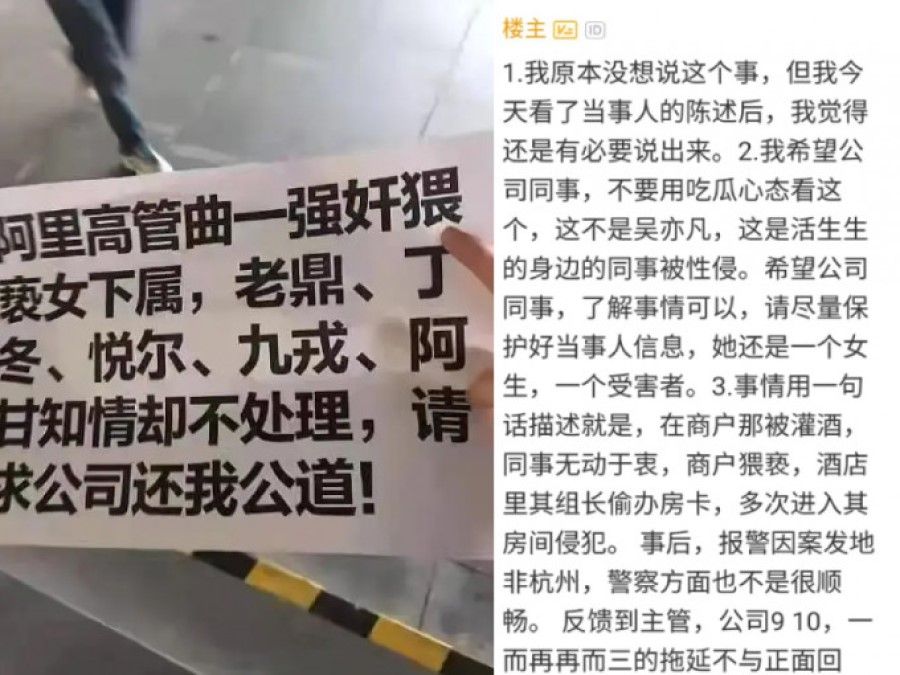
Many people found it difficult to believe that all this happened in Alibaba, known as a model for the internet industry, where one out of three senior management positions are held by women, and whose founder Jack Ma once said that having women in senior positions was the secret to the company's success.
Large-scale drinking sessions are "horrible orgies", "a horrible sight to behold" and it is expected that "incidents" might happen after people drink.
Qin Shuo, founder of the Commercial Civilization Research Center of China and Chin@ Moments, said in an interview with Yicai: "Alibaba's response to this incident has been disappointing. It did what it should have done long ago only under strong social pressure."
The fact is that the drinking culture that is prevalent in China's workplaces is not just coming out today, nor is it unique to the internet technology industry with its gender imbalance. Looking at reports and public information, such a culture is pervasive from state-owned banks and universities to company recruitments and gatherings. Many Chinese feel that being able to hold one's drink and persuade others to drink is not a rotten culture but a skill to be rewarded.
On 10 August, Chu Yin - a research fellow at the Center for China and Globalization and professor at the University of International Relations - posted a video on Weibo saying that when it comes to drinking, Alibaba does not even rank. In some companies, the top person leads the drinking. Large-scale drinking sessions are "horrible orgies", "a horrible sight to behold" and it is expected that "incidents" might happen after people drink.
China's business drinking culture
Indeed, alcohol does have an important role in socialising in China, as it generally livens the atmosphere and brings people together. But when there is inequality of power and position, drinking becomes a test and conquest.
"You won't drink it? If you don't, you're not giving me face."
"If you don't drink it, you're not treating me as a friend!"
"You're not even willing to drink, and you're still asking me to help you?"
These familiar lines are often powerful weapons to get people to drink, and shows on different levels that the drinking culture is in fact a culture of power.
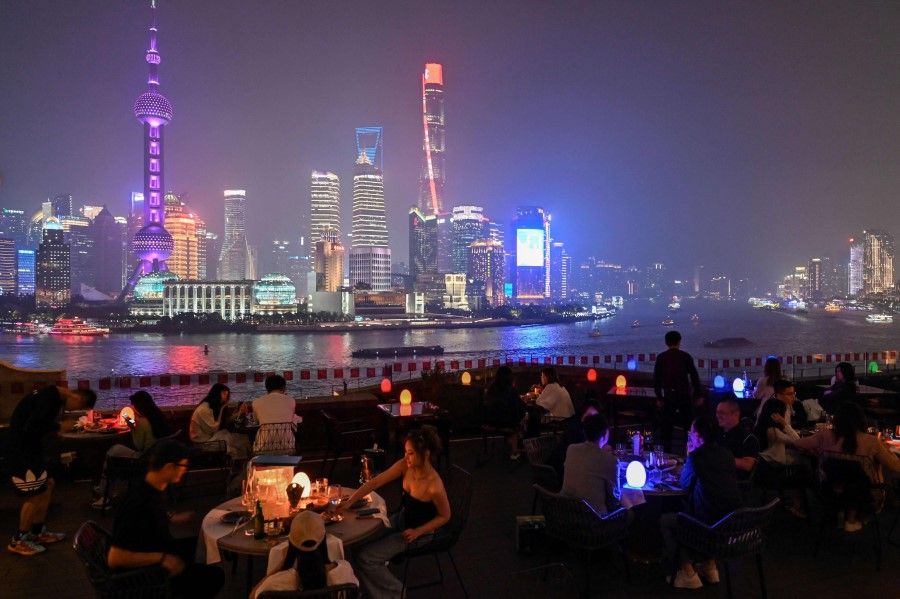
In workplace interactions, it is usually superiors who try to get subordinates to drink; clients towards employees, and men towards women. The Alibaba case meets all of this.
But from the initial response of Alibaba's management, there seems to be a consensus among Chinese companies to drinking culture: drinking is a normal part of socialising and there is no need to make a big deal of it, much less create a big hoo-ha about it.
...ironically, while they applaud the calling out of heinous drinking culture, new employees are concurrently checking out drinking and socialising tips so as to get noticed by bosses.
There has been constant news about employees in all sectors being forced to drink, and they do prompt a reflection on drinking culture at that point. For example, last year, news of a new hire at Xiamen International Bank being slapped and insulted after he refused to drink a toast with his boss sparked much discussion.
The new hire at the Zhongguancun branch of the bank could not drink due to personal reasons, and declined a toast offered by a high-level boss at his first gathering, following which his immediate boss came up to him and slapped him while bursting out in foul language.
Subsequently, the bank issued a statement acknowledging inappropriate speech and behaviour by a manager towards a staff surnamed Yang, and expressed deep apologies.
In a poll at the time, most netizens said they felt tormented by business drinking sessions; however, ironically, while they applaud the calling out of heinous drinking culture, new employees are concurrently checking out drinking and socialising tips so as to get noticed by bosses. They are indeed at the receiving end of the deeply-rooted drinking culture.
One new hire revealed that during recruitment, the human resource personnel asked if they could drink, and said that being able to drink would be a plus.
Also, a professor in Zhejiang has openly supported the drinking culture. In 2019, Zhejiang University professor Feng Gang posted on Weibo that those who wanted to study under him should be able to drink at least half a catty (about 250 ml) of liquor at 50% alcohol content.
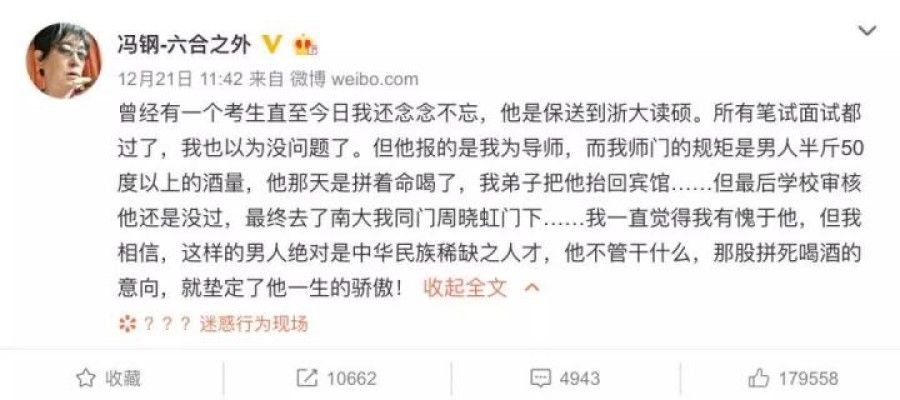
One candidate drank himself unconscious hoping to get Feng as a mentor, but was not selected by the school in the end. However, Feng praised him on Weibo: "Such a man is a talent that is lacking among the Chinese people. No matter what he does, that willingness to drink to the death is his life's pride!"
The professor's comments drew ire and criticism from many netizens at the time. However, such incidents fade away over time.
When females encounter a distorted 'drinking culture'
Add "women" to "drinking culture" and the inequality is exacerbated.
The aforementioned female Alibaba employee wrote in her online post that her manager had requested her to drink with a client. When they were drinking, the manager allegedly told the client, "Look at how good I am to you, I brought you a beauty."
The male manager was probably unaware that even before he had pressured the female employee to drink excessively, his frivolous speech that directly commodified women was already very disrespectful.
Whether in the interaction with clients or the repulsive exchanges with colleagues, female employees are regarded as tools and put in an extremely disadvantaged position.
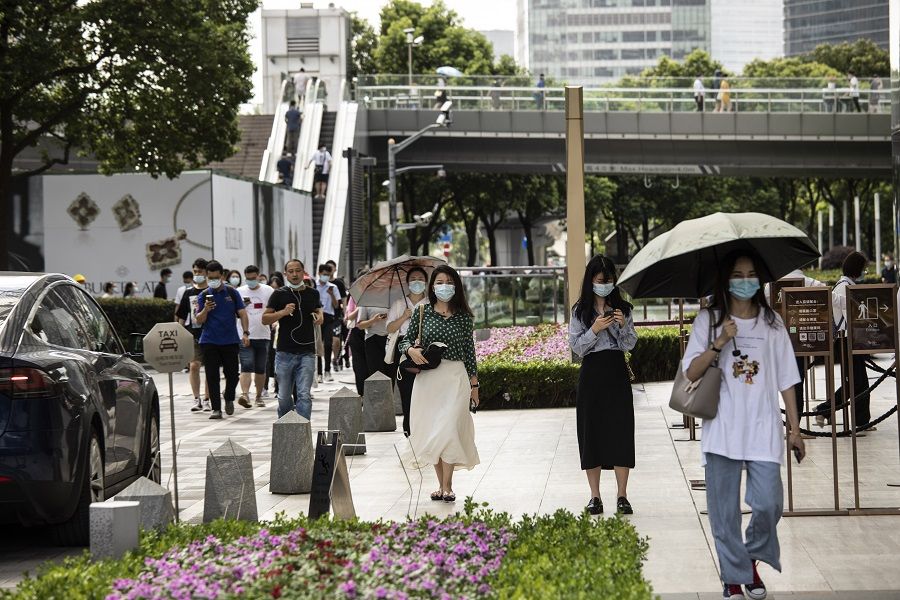
Since this incident was exposed, Alibaba's long-standing "ice-breaking culture" also came to light along with shocking revelations of its actual content and nature.
It is understood that the so-called "ice-breaking culture" is an internal culture of some enterprises that seek to unify the ideology and values of new employees by requesting them to "tear down" their original self and "rebuild" a new one.
Quoting insiders with knowledge of the ice-breaking culture, WeChat official account "wy-xcs (麦杰逊)" wrote that such a culture involves playing icebreaker games which include: having male employees hold a bottle between his legs and then asking female employees to use their mouth to open the bottle cap; having female employees lie on the floor while male employees are asked to do push-ups on top of them; having one person act as a pole while another person dances around him or her; and asking various personal questions such as the "when, where, and who" of their "first times" and which male employee they would choose to be their husband.
Whether in the interaction with clients or the repulsive exchanges with colleagues, female employees are regarded as tools and put in an extremely disadvantaged position.
An online commentary posted by China Daily on 10 August pointed out that such a distorted drinking culture that pressurises women to drink excessively so that indecent acts and even sexual assaults can be performed on them under the guise of business dealings should not be tolerated under any circumstances.
The article asserted that enterprises that commodify women with frivolous speech at the dining table will not only expose their own cultural weaknesses and poor disposition but also fail to win society's approval and support. Enterprises should win the favour of good business partners through careful investigation and research - those that do business by endorsing the liquor bottle rather than the company's standard, or drinking ability rather than the company's conduct, or play on emotions rather than rules, have clearly gone down the wrong path.
The article called for the rejection of the distorted drinking culture and advocates respect and care for women. Nurturing a civilised and healthy business civilisation and corporate culture requires all aspects of society to be held accountable.
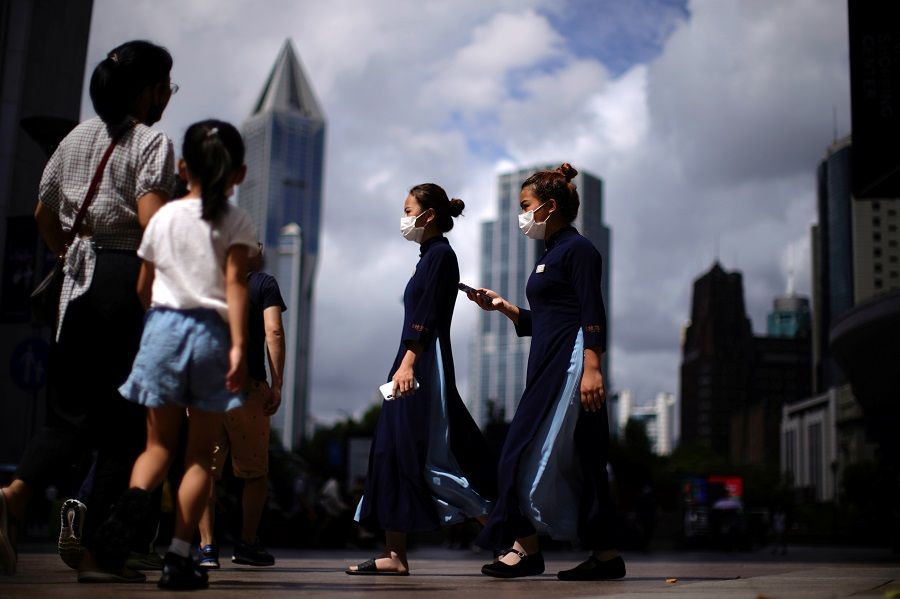
China's Central Commission for Discipline Inspection emphasised in a notice posted on 10 August that violations of the law should be severely punished, and that bullying culture, "disgusting drinking culture", and other "unspoken rules" be eliminated. The key to breaking these unspoken rules is to instil correct values and eliminate the abuse of power. At the same time, it is necessary to continuously eliminate the breeding grounds of various unspoken rules.
Can the younger generation end a bad drinking culture?
Early on in 2013, a survey conducted by China Youth Daily's social research centre on 109,441 youths showed that 35.7% of interviewees had to attend a minimum of three business drinking sessions per month. 84% of them said that they dislike the present drinking culture.
China News Weekly posted a survey on 9 August asking young people how much they disliked the drinking culture. Over 90% of respondents picked the option "extremely disgusted, unacceptable", while a portion of netizens chose the option "hard to reject, no choice".
In 2020, it was made known that a new hire of the Xiamen International Bank was slapped for not drinking alcohol. Back then, topics such as "how annoying is the drinking culture" became top searches on Weibo, attracting 490 million views. Relevant searches related to business drinking also garnered over 100 million views.
A newbie at work pointed out, "Competing to see who can drink more is insane. It is not sound to win trust by damaging one's health. People will continue to seek power, but it should not be achieved through drinking."
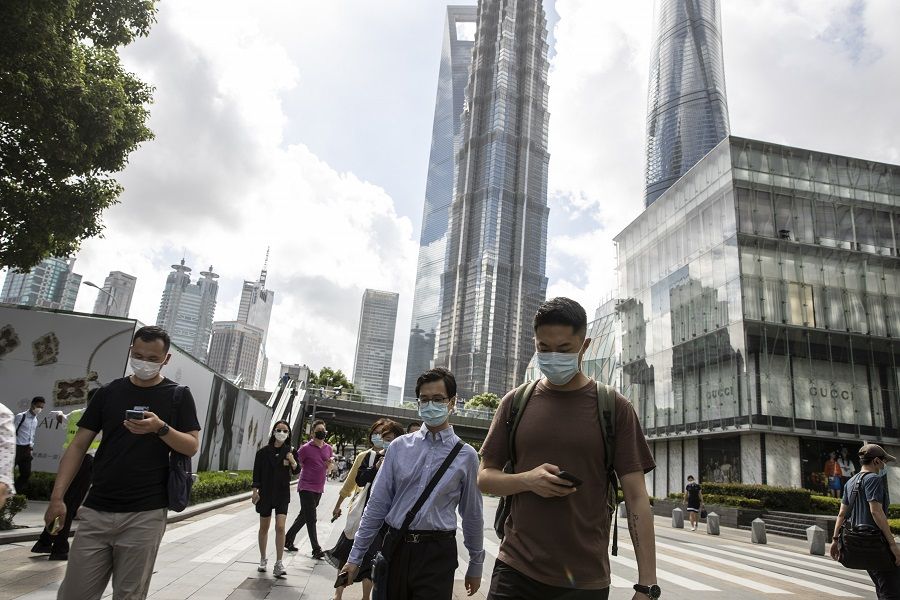
However, this culture cannot be eliminated by only relying on the awakening of the younger generation. It needs to be supported by company regulations and law.
A renowned business school professor pointed out to Yicai, in the past, even if corporate leaders were aware of the situation, they did not systematically implement corresponding rules and regulations. As this issue involves corporate culture, he believes that all companies should pay attention to it because the incident has crossed the red line of many young employees and has received much attention as a social phenomenon and business practice.
The crux of the matter lies in the fact that society must reshape its set of workplace culture and values, and prevent the drinking culture from becoming a breeding ground for unspoken rules.
Yicai also noted that US enterprises have in place strict anti-harassment policies. In some enterprises, even the CEO is unable to escape punishment if they are found to be involved in sexual misconduct cases.
The article also quoted American legal academic and lawyer Zhang Jun as saying, "Large foreign companies have in place a series of mechanisms and measures to prevent sexual harassment. Overseas Chinese internet companies should also remain vigilant and establish a series of systematic rules and regulations. For example, the drinking culture in Chinese enterprises is expressly forbidden in the rules and regulations of many foreign enterprises."
However, the problem is that the drinking culture has already become a common social interaction in Chinese workplaces and a one-size-fits-all ban on business drinking is obviously not in line with national conditions. The crux of the matter lies in the fact that society must reshape its set of workplace culture and values, and prevent the drinking culture from becoming a breeding ground for unspoken rules. Forcing drinks on others and expecting female employees to charm and please clients should not become "value adding" tasks at work. Neither should employees become the victims of this ugly drinking culture.
Related: Kris Wu's downfall and the dark side of big capital | Is Alibaba doomed? [Part I] | Blacklisted and fined: The end of Chinese tech companies' heyday? | 72-hour workweek in China's tech companies: Driving innovation or destroying workers? | Fudan University's murder case: China must look after returning top talents | Why Chinese women are unwilling to give birth
